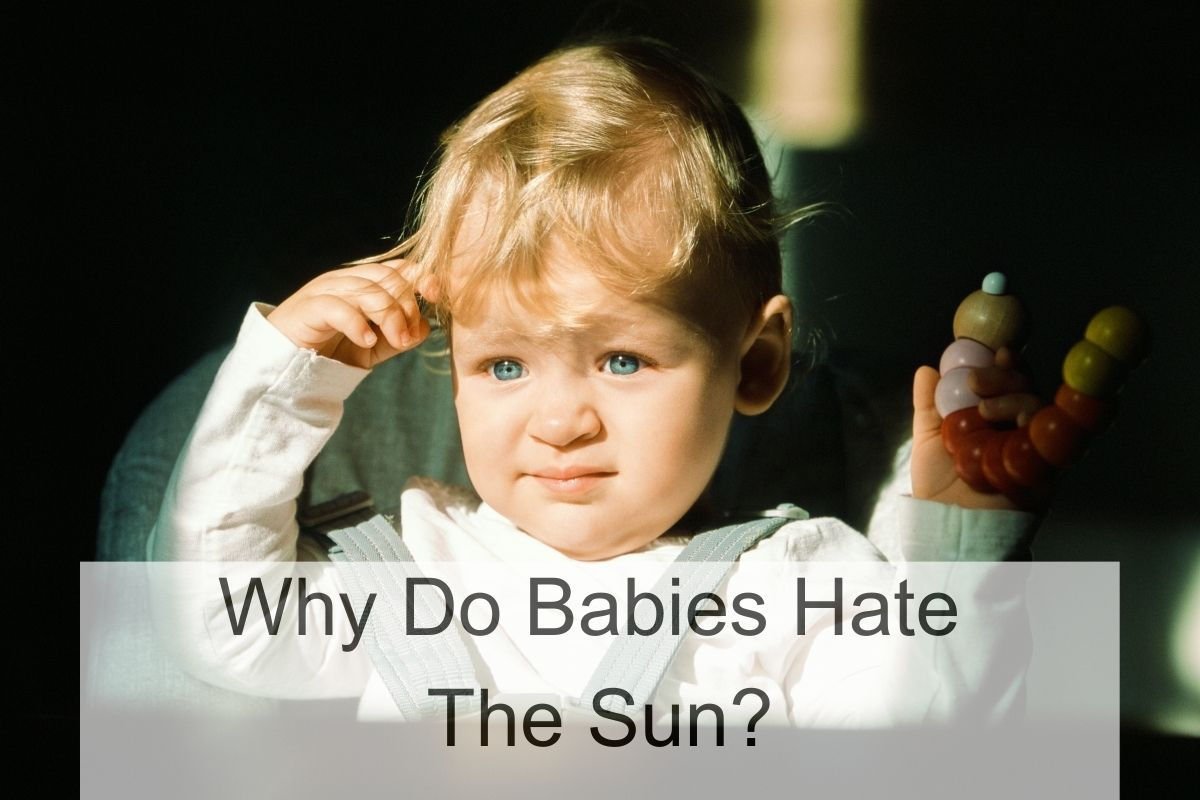As a new parent, one of the things you may have noticed is that your baby does not seem to enjoy being in the sun. In fact, they may even cry or fuss when exposed to sunlight. So, why do babies hate the sun? As it turns out, there are several reasons why your little one may not be a fan of the great outdoors, and it’s important to understand them to keep your baby safe and healthy.
One possible reason why babies dislike the sun is that their skin is much more sensitive than adults. The sun’s UV rays can cause skin damage and even sunburn in babies, which can be painful and uncomfortable. Additionally, babies have a higher risk of dehydration and overheating in hot weather, which can make them irritable and fussy. As a result, it’s important to take extra precautions when exposing your baby to sunlight, such as using sunscreen, hats, and lightweight clothing.
Another reason why babies may not enjoy being in the sun is that they are more prone to photophobia, or light sensitivity. This can cause discomfort and even pain when exposed to bright light, which can make your baby fussy and irritable. If you suspect that your baby may have photophobia, it’s important to talk to your pediatrician to rule out any underlying medical conditions. In the meantime, you can try using a stroller canopy or umbrella to provide shade and reduce the amount of sunlight your baby is exposed to.
Understanding Infant Vision

As a new parent, it’s important to understand how your baby’s vision develops. Here are a few key things to keep in mind:
Development of Sight
At birth, your baby’s eyes are not fully developed. They can only see in black, white, and shades of gray. Over time, their vision will improve and they will begin to see more colors and shapes. By the time they are 2 months old, they will be able to see bright colors and distinguish between different shapes.
Sensitivity to Brightness
Babies are more sensitive to brightness than adults. This is because their eyes are still developing and are not yet able to filter out excess light. As a result, they may become fussy or uncomfortable when exposed to bright sunlight. It’s important to protect your baby’s eyes with a hat or sunglasses when outside.
Remember that every baby is different, and their vision will develop at their own pace. If you have concerns about your baby’s vision, talk to your pediatrician.
Sun Exposure and Baby’s Comfort

As a parent, I understand how important it is to keep our babies safe and comfortable. Sun exposure is an important topic to consider when it comes to our little ones. In this section, I will discuss how sun exposure affects a baby’s comfort and what we can do to protect them.
Sun Protection for Infants
According to UCSF Benioff Children’s Hospital, infants under 6 months of age should be kept out of direct sunlight. Their young skin doesn’t have the ability to metabolize and excrete chemicals often found in sunscreens. Instead, we can dress our babies in lightweight sun-protective clothing that breathes and covers the arms and legs.
When it comes to sunscreen, we should consult with our pediatrician to see if it is safe to use on our baby’s skin. If sunscreen is recommended, we should choose a mineral-based sunscreen with an SPF of 30 or higher. We should apply the sunscreen to areas of our baby’s skin that cannot be covered with clothing, such as the face and hands.
Signs of Discomfort
Babies may become uncomfortable when exposed to the sun for too long. According to MomInformed, signs of discomfort may include fussiness, crying, and rubbing their eyes. As parents, we should pay attention to these signs and take action to protect our babies from the sun.
To keep our babies comfortable, we can provide shade using an umbrella, canopy, or the hood of a stroller. We should also dress our babies in loose-fitting, lightweight clothing that covers their arms and legs. Additionally, we can use hats and sunglasses with UV protection to shield their face and eyes from the sun.
Biological Factors

As a pediatrician, I have seen many babies who seem to hate the sun. While there are many reasons why a baby may not enjoy being in the sun, biological factors play a significant role.
Pupillary Light Reflex
One of the reasons why babies may not like the sun is due to their pupillary light reflex. This reflex is responsible for controlling the size of the pupil in response to light. When a bright light is shone into a baby’s eyes, their pupils will constrict, reducing the amount of light that enters the eye. This reflex is important for protecting the baby’s eyes from damage due to excessive light exposure.
Melanin and Eye Protection
Another biological factor that affects how babies respond to the sun is melanin. Melanin is a pigment that is responsible for giving color to our skin, hair, and eyes. Babies have less melanin than adults, which means that their skin and eyes are more susceptible to damage from the sun’s harmful UV rays.
However, babies do have some natural eye protection in the form of the crystalline lens. This lens is responsible for filtering out some of the UV rays that enter the eye. As babies grow and develop, their eyes will continue to mature, and their natural eye protection will improve.
Emotional Responses to Sunlight

As a new parent, it’s important to understand that babies can have emotional responses to sunlight. Here are two ways sunlight can affect your baby’s emotions.
Stranger Anxiety and Sunlight
Babies may experience stranger anxiety when they are exposed to sunlight. This is because the bright light can make it difficult for them to see familiar faces, which can make them feel uncomfortable around strangers. It’s important to be aware of this and try to keep your baby in familiar surroundings when they are exposed to sunlight.
Association with Sleep Cues
Sunlight can also be associated with sleep cues for babies. This is because sunlight can help regulate a baby’s sleep-wake cycle. Exposure to sunlight during the day can help your baby feel more alert and awake, while exposure to darkness at night can help them feel more relaxed and ready for sleep. It’s important to establish a consistent sleep routine for your baby, which includes exposure to sunlight during the day and darkness at night.
Practical Tips for Parents
As a parent, it’s important to protect your baby from the sun’s harmful rays. Here are some practical tips to help you keep your baby safe and comfortable while enjoying the outdoors.
Creating a Shady Environment
One of the easiest ways to protect your baby from the sun is to create a shady environment. This can be done by using an umbrella, a canopy, or the hood of a stroller. If you’re at the beach or park, look for a shaded area where you and your baby can relax. Remember that shade is the best way to shield your baby from the sun, especially if he or she is younger than six months old.
Using Hats and Sunglasses
Another way to protect your baby from the sun is to use hats and sunglasses. Hats with wide brims can help protect your baby’s face, neck, and ears from the sun. Sunglasses can help protect your baby’s eyes from the sun’s harmful rays. Look for sunglasses that block 100% of both UVA and UVB rays.
Gradual Sun Exposure
If you want to expose your baby to the sun, it’s important to do so gradually. Start with short periods of time in the sun, and gradually increase the amount of time your baby spends outside. Remember to apply sunscreen to your baby’s skin if he or she is older than six months. Look for a sunscreen that is specifically designed for babies and toddlers, and has an SPF of at least 30.

